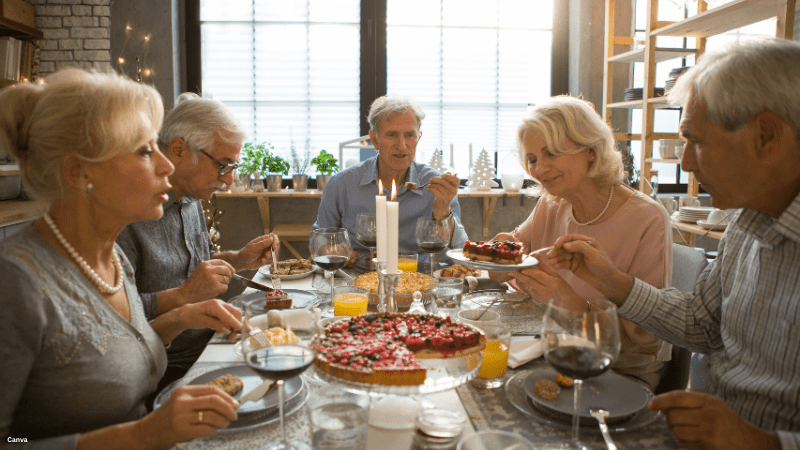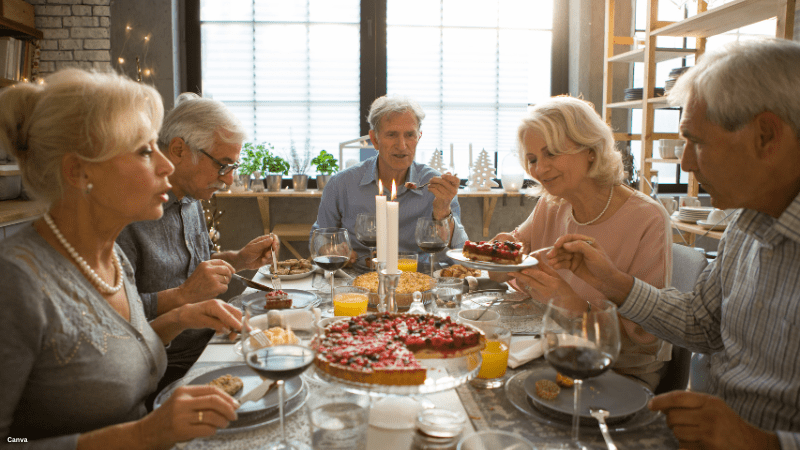The Impact of Social Connections on Healthy Aging
Building Relationships for Longevity: How Social Connections Enhance Physical and Mental Well-being in Aging Adults
There is no one solution to aging gracefully, such as a specific exercise, food, or medication that guarantees a long and healthy life. However, there may be something that comes close: maintaining strong social connections.
The Key to Graceful Aging
According to Amit A. Shah, M.D., a geriatrician, internist, and palliative care specialist at Mayo Clinic, after many years of caring for older patients, he has found that factors typically believed to be crucial for aging well, such as family longevity or physical health, do not necessarily result in a positive aging experience. Instead, it is the quality, duration, and nature of our relationships that appear to have the greatest impact.
The Surprising Benefits of Social Connections
Dr. Shah adds, “People are often surprised by the research that shows a correlation between social interaction and significant health benefits. Interacting with others is like exercise for the brain, and it may be more beneficial than activities like crossword puzzles or brain games.”

Image credit: Canva Pro
The Dangers of Loneliness and Isolation
The risks associated with loneliness and social isolation are significant. While obesity and smoking are commonly discussed health risks, Dr. Shah explains that loneliness and social isolation are just as dangerous. These risks may include depression, anxiety, increased risk of suicide, and other chronic health issues.
Unique Challenges for Vulnerable Groups
Studies have also shown that for specific groups, such as first-generation immigrants and the LGBT community, social isolation, loneliness, and poor social relationships are linked to a higher risk of premature death, dementia, heart disease, and stroke.
Strategies for Maintaining Social Connections
Overcoming Hearing Loss
So, the question is: How can we maintain social connections as we age? One of the most challenging aspects of aging is that our friends and family members may move away or pass away. Dr. Shah states, “This can be especially difficult for those who live into their 90s or 100s. They may have a close group of friends or work hard to make new connections, only to see those friends lose their abilities or pass away.” Although we cannot replace our dearest connections, it is essential to continue making new acquaintances and nurturing the relationships we have.
Dr. Shah advises his patients, “Taking action is critical. While it may be daunting to be in social situations, it is necessary. It takes effort to get to know someone new or make a new connection, but it is vital for our cognitive function. Think of it as a workout for your soul, happiness, and brain health.”
Encouraging Outdoor Activities
Here are three ways to start building social connections in your later years:
1. Get hearing aids (or use the ones you have!): Hearing loss is a common reason for social isolation. If we cannot hear, it is challenging to engage in conversation. However, hearing aids can make a significant difference. Dr. Shah notes, “When we cannot hear, our brain stops listening. Research has shown that ignoring or not addressing hearing loss can result in faster cognitive decline.” He adds, “Using hearing aids has been linked to a longer life expectancy. It may seem unbelievable, but it makes sense. If we go to a social event or restaurant and cannot hear anyone, we may stop going out altogether. This can lead to becoming homebound, which can have a negative impact on our physical and mental health.”
2. Get out of the house: Many older adults are hesitant to leave the house due to common age-related challenges, such as vision loss, incontinence, disability, or lack of transportation. However, it is essential to find ways to overcome these obstacles. Dr. Shah points out, “There was a successful program in Baltimore public schools where older adults read to children. While the children may have enjoyed it, the real benefit was getting the older adults out of the house and involved in a meaningful activity. It gave them a purpose and increased their physical, cognitive, and social activity.” He continues, “When we venture out into the world, we learn new things and make new memories, which exercise various areas of our cognition, such as executive function, spatial function, and memory. It is like a workout for our brain.”
3. Actively seek out opportunities to connect with others: Dr. Shah reminds us, “Just because we are older, it does not mean we should stop nurturing our current relationships or building new ones.”
Addressing Loneliness During Life Transitions
Some ideas for making new friends or connections include:
- Staying in Touch with Loved Ones: Making a schedule to keep in touch with friends and family through email, phone calls, cards, or social media.
- Pets as Social Catalysts: Adopting a pet for companionship, which can also lead to interactions with other people
- Participating in Community Activities: Getting involved in activities like walking with a friend or trying a new sport.
- Engaging with Neighbors: Talking to our neighbors and organizing a block party.
- Joining Faith-Based or Volunteer Groups: Connecting with others through faith-based groups, classes, or volunteer work.
It is essential to be prepared for loneliness during times of life transitions. These include retirement, the loss of a spouse, or moving away. Dr. Shah advises, “During these times, it is crucial to establish a social network with mentors and friends who can introduce us to new people.”
By actively maintaining and building social connections, we can significantly enhance our physical, mental, and emotional well-being, leading to a healthier and happier life as we age.
Source:
Mayo Clinic (March 15, 2024). A surprising key to healthy aging: Strong social connections. https://mcpress.mayoclinic.org/healthy-aging/a-surprising-key-to-healthy-aging-strong-social-connections/. Accessed May 24, 2024
Category
- Health Issues (72)
- Healthy Diet (48)
- Herbs for Health (11)
- Mental Health (33)
- Skin Care (20)

